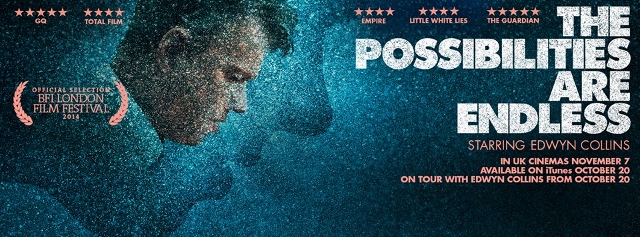On February 20, 2005, Edwyn Collins collapsed at home while suffering from a major brain haemorrhage. To put it awfully bluntly, that could all too easily have been the end of him. It would have drawn the curtain on the fascinating, distinctive career of a singer and songwriter, initially part of Scottish pop-soul troublemakers Orange Juice, and then as a beloved solo artist.
But it didn’t. Collins was rushed to hospital and suffered a second haemorrhage. He was kept in intensive career for weeks, his life hanging in the balance. But he survived. Afterwards, the effects were devastating: he couldn’t move without assistance, couldn’t read, write or even speak without great difficulty. His memory of his own career and songs was virtually non-existent. But he did have the unfailing love and support of his wife and manager, Grace Maxwell. Within two years, he was speaking, reading, writing, recording and playing live again. That’s not to say the haemorrhage hasn’t left its mark. But he did it. And The Possibilities are Endless is the story of how he did it.
This isn’t your average big-screen rock documentary – not even the ‘triumph over adversity’ kind. There are no talking heads here, no explanatory captions. And that’s largely a good thing. Essentially, it’s in three sections, mirroring the three stages that Collins went through. The first third is almost entirely abstract and expressionistic. After a fleeting introductory clip of Collins performing A Girl Like You live and being interviewed by Conan O’Brien, we’re quite literally in at the deep end. What follows is a steady stream of images of landscapes and nature – particularly of water – plus a few unknown, unspeaking figures popping up. Over this, there’s evocative incidental music composed by Collins especially for the film, and audio of Collins and Maxwell talking about the terrifying experience of his haemorrhage. But they’re not really describing it as such. They’re talking about how it felt. At no point are the exact details of Collins’s ordeal spelt out. It’s almost like some experimental, illustrated radio play. Viewers might even feel unsettled and lost, but it’s nothing to what Collins himself must have gone through. It’s a strange, immersive evocation of a frankly unimaginable ordeal.
 Next we’re on to his release from hospital and slow struggle with his condition. Here, things get a bit more tricksy and inventive. Collins and Maxwell are seen back at home, quietly trying to piece their lives, and Collins’s health, back together. But evidently they’re re-enacting these trying moments from a few years ago, which strikes an odd chord. It can be powerful stuff, though, particularly when we see Collins watching clips of his younger pop star self without a flicker of recognition on his face, only bewilderment.
Next we’re on to his release from hospital and slow struggle with his condition. Here, things get a bit more tricksy and inventive. Collins and Maxwell are seen back at home, quietly trying to piece their lives, and Collins’s health, back together. But evidently they’re re-enacting these trying moments from a few years ago, which strikes an odd chord. It can be powerful stuff, though, particularly when we see Collins watching clips of his younger pop star self without a flicker of recognition on his face, only bewilderment.
There’s also some filling in of the couple’s back story, with their teenage son, William, appearing in footage as a younger Collins, and Yasmin Paige, of Submarine fame, as young Maxwell. There’s no dialogue though, just a few evocative moving tableaux of their courtship. Obviously it is a difficult part of the story to convey successfully, but in among so much that’s homespun and organic and genuine, this slightly plasticky fabrication does jar. It’s one of the only mis-steps in the whole film.
The final strait is on surer ground. The presentation opens up, with Collins and Maxwell shown in snatched, unstaged moments, as he gingerly resumes his recording and performing career. He’s back in action, in his element, surrounded by banks of guitars, studio equipment, adoring audiences – and Maxwell. Wrapped in a duffel coat, walking with a cane, he becomes a genuinely, unexpectedly heroic figure.
In his youth, Collins was so witty and eloquent that it’s heart-wrenching to see him defeated by language. The phrase deployed as the film’s title was, in fact, one of the very few things, other than Maxwell’s name, that he could say in the immediate aftermath of his hospitalisation. But in time he overcomes this, and towards the end he’s laughing and teasing young William, and mock-bickering with Maxwell (she takes his ‘Sharon Osbourne’ jibe surprisingly well).
Plus, his current, hesitant, round-about mode of expression often hits the nail squarely on the head. For instance, he compares, with awesome honesty, his old and new selves: “Possibly, before my stroke, I was a bit too focussed. No, no – I was nice, don’t get me wrong. But I was arrogant, in a way. I’m over that phase.” Or, on the changing nature of love: “Back then, love was lust. Loving is sometimes complex. Nowadays, love is real.” Would that we all had such devastating insight. On a lighter note, Collins’s deep, irrepressible chuckle, which is heard more and more as the film goes on, is absolutely uplifting, too. And if, after all he’s been through, you can get through the appearance of his song Home Again without a tear, frankly your soul needs work.
It’s a very stylish, uncluttered documentary, and essentially such a simple, universally human tale – about life, love and survival – that anyone could enjoy, even if their working knowledge of Collins’s career goes no further than half-remembering Rip it Up and A Girl Like You (perhaps a caption or two wouldn’t have hurt too much in this respect, mind you). Really, it’s a highly unconventional love story, about Collins being nurtured and saved by Maxwell – but it’s very far from lovey-dovey and sickly sweet, thank heavens. It’s never over-egged, but the dialogue between them, whether it’s spoken or not, is what drives the whole thing. Maxwell, incidentally, has already told her side of this story in her 2009 book Falling and Laughing, which surely helped to inspire the film, but which takes a much more conventional route.
On the down side, there are perhaps moments when the audience’s concentration is stretched a bit, and longueurs loom; but then it’s rather heartening to see a film which rewards, rather than underestimates, the viewer’s attention. There’s real artistry on show here, sensitive and skilful. Collins’s score deserves a mention, too. It’s very articulate and spare, mixing keyboards and guitars to faintly Krautrocky effect – think Popol Vuh‘s enchanting soundtracks to Werner Herzog‘s work.
Admittedly, we love Edwyn Collins here at Northern Soul – so much so that we made him our Man of the Year in 2013, off the back of his extraordinary recent live shows. The story of his miraculous restoration is so beautiful and touching that this couldn’t go entirely wrong. Then again, it’s hard to put such things across in sound and vision alone. The Possibilities are Endless takes some brave, unexpected choices in trying to do so and, while it’s not entirely without flaws, ultimately it pulls it off with aplomb, and does Collins proud.
By Andy Murray
The Possibilities are Endless is on release in UK cinemas from November 7, 2014. Prior to that, it’s on a special limited tour, with one-off screenings followed by a Q&A with Collins and a live acoustic performance. It’s also available to download from iTunes now.
Northern dates are:
November 13, 2014: Leeds Film Festival
November 14, 2014: Manchester Dancehouse













